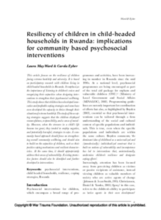This article focuses on the resilience of children facing extreme hardship and adversity. It is based on participatory research with children living in child headed households in Rwanda. It emphasizes the importance of listening to children’s voices and recognizing their capacities when designing interventions to strengthen their psychosocial wellbeing.
This study shows that children have developed innovative coping strategies and some haveeven developed the capacity to thrive through their situation ofextreme hardship.The study of these coping strategies suggests that the children displayed resourcefulness, responsibility, and a sense of morality. However, when the stressors in a child’s life became too great, they tended to employ negative, and potentially harmful, strategies to cope. A community based approach should focus on strengthening overall community wellbeing, and should aim to build on the capacities of children, such as their positive coping mechanisms and resilient characteristics. At the same time, it should appropriately address their areas of vulnerability. Existing protective factors should also be identified and further developed in interventions.

